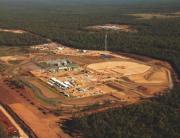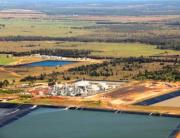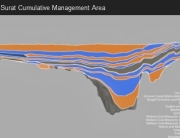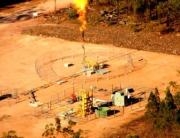Landholders urged to share their CSG concerns
Landholders concerned about coal seam gas (CSG) development were told to keep in close contact with the CSG Compliance Unit and Department of Environment and Heritage Protection (DEHP) to ensure their voice continues to be heard, at the Basin Sustainability Alliance (BSA) Annual General Meeting (AGM) in Dalby on Wednesday afternoon.
More than 50 people from across Western Downs, Toowoomba region, Brisbane and the Sunshine Coast, along with Gasfields Commissioners, Ian Hayllor and Ray Brown, attended the meeting where guest speakers, David Free, Senior Hydrologist with the government’s CSG Compliance Unit and Anne Lenz Executive Director with the DEHP encouraged landholders to contact the department with their queries and questions rather than sitting back worrying about issues.
Chair David Hamilton said that he appreciated the openness of the guest speakers and their willingness to listen to legitimate concerns being raised by BSA and its members.
“Ms Lenz told our members last night that if we don’t communicate regularly with government then we risk allowing government to only hear a one-sided view of the industry from the perspective of the CSG companies” Mr Hamilton said.
At the meeting Mr Hamilton took the opportunity to unveil BSA’s proposed new initiative called “CSG Watch” that would see landholders band together to solve problems associated with the CSG industry locally.
“CSG Watch will empower landholders to keep a watchful eye on CSG issues and assist BSA to look for trends, common concerns and cumulative impacts so we can effectively and credibly communicate with the Gasfields Commission and the CSG Compliance Unit.
“We want to be very clear that this is not about spying or hidden cameras, it’s about empowering local groups to help solve problems.”
Other speakers included experienced solicitors, Tom Marland of Emanate Legal, and Peter Shannon of Shine Lawyers, who outlined their concerns with the land access laws and “make good” arrangements, and urged landholders to do thorough baseline bore testing and arm themselves with as much data as possible prior to any CSG activity on their land.
“Mr Marland expressed his wariness about the concept of adaptive management which has been a concern of BSA’s for quite some time. To BSA the idea of adaptive management is reactive not proactive,” Mr Hamilton said.
Mr Hamilton also stated, BSA still had a lot of questions unanswered. We’re concerned about the lack of fairness in the landholder negotiations, underground inter connectivity, effects on water quality, and just how effective “make good” arrangements really will be implemented in practice. We are worried that landholders will be forced to take cash in place of their water. As we know money doesn’t grow crops or feed stock.
“Above all we are still unclear as to whether the government has the power to force companies to cease activities if the risks are found to be too high.
“We feel that while there are some good people in government departments trying to do the right thing this industry will keep steaming on regardless of potential harm.”
At the meeting, BSA chair thanked retiring committee members Bernie Caffery and Max Winders, BMO Business Centre for its assistance with secretariat services to the committee, Shine Lawyers for its continued support to the committee and members, and acknowledged donations from the former Environment and Property Protection Association and Future Food Queensland, along with recent sponsorship from Wambo Cattle Company.
BSA’s new committee includes Chair David Hamilton, Vice Chair Wayne Newton, Treasurer Lyn Nicholson, Secretary Ruth Armstrong, committee members Anne Bridle, Veronica Laffy, Neil Cameron, Dale Stiller and Lee McNicoll.
The chairmans’ report, along with membership details can be found at www.notatanycost.com.au.







